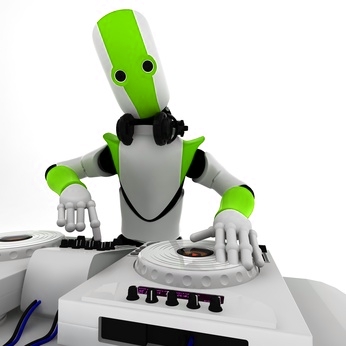It’s difficult for humans to ‘live in the present’; we are wired to worry about the future, and to dwell upon the good things of the past. These instincts serve us well, since overestimating negative future possibilities better prepares us for them, and having nostalgia for the past suppresses memory of hardship, making life overall seem better and more worth investing in.
Futurist groups such as Transhumanists and Singularitarians tend to take a different approach, coming at things in almost the opposite way; focusing on the anticipated happiness of the future and all the wonderful things it will bring, and having little interest in life in the past.
And like the past, ‘the present’ in Transhumanist culture has become almost completely invisible.

Neuromancer inspired the Cyberpunk counter-culture of the 80's and the 90's
In a recent interview for H+ magazine, R. U. Sirius is asked to compare present day Transhumanists with those of the early 90s, sometimes referred to as the ‘Mondo 2000′ culture. He argues that in comparison with Transhumanists today, “the emphasis would have been on living more intensely, more aesthetically, more hilariously, more erotically, more intelligently, more communicatively, more spontaneously” and, “more psychedelically.”
Has something been lost?
As identified by R.U. Sirius, there is a greater focus on health and life extension on the part of Transhumanists today that wasn’t present in the early 90s. Interest in health and longevity has always been an important part of Transhumanist belief in self-improvement and human excellence, but in recent years, these interests have taken ‘center stage’, and are in direct conflict with cyberpunk and party lifestyles.
But I wonder: how much of the focus on health by Transhumanists today has to do with self-improvement and excellence, and how much to do with ‘making it to the future’?
In the mid to late 90s, when Vernor Vinge and Ray Kurzweil started giving more concrete and reliable predictions for the Singularity, the orientation of the movement as a whole began to shift. Early Transhumanists didn’t have reliable graphs predicting the progress of technology, indicating what to expect in each coming decade, they didn’t have large scale, multi-disciplinary works, such as What Technology Wants and The Singularity Is Near, unifying and synthesizing ideas of technology, and they certainly didn’t have books like Transcend, outlining how to live long enough to benefit from life extension technologies underway, and see the Singularity.
The future is now predicted with great detail and certainty, and is understood as something that we at all costs do not want to miss; it has become the main thing that we think about, and we have become very focused on making sure that we, as individuals, get there.
There are analogies to be made here with religious groups seeking to gain immortality in heaven. Those of Christian faith, though for moral reasons rather than scientific reasons, limit themselves in this life for the chance at immortality. This behavior, because of the timeline we now have in front of us, has in a way, manifested itself in the scientific community looking to achieve immortality through technology.
But has ‘making it to the Singularity’ become a major, subconscious, determinant of Transhumanist behavior, academic pursuit, and culture? Has an ‘eye on the prize’ behavior covertly ensued, devaluing the importance of ‘living in the present’?
I would say ‘yes’.
In the past ten years, age-specific worries of older Transhumanists have come to shape the movement as a whole; if this were not the case, interest in health for the average young person, even after learning of 2045, likely would not have become more than a minor interest in eating well and exercising. But as Sirius argues, it has become a defining attribute, and we “pay attention to every pulse.”
Perhaps this health centric behavior doesn’t seem radical because being health-conscious gets external validation from mainstream interest in weight loss, baby boomer interest in disease prevention, as well as current medical debates surrounding additives and organic food. Also, DIY biology is an associated part of the decentralization of knowledge and power that has always been a part of Transhumanism, so a growing interest in medicine is natural from that point of view, especially as our access to knowledge increases.
Important to point out also, Transhumanist culture, in comparison with cyberpunk culture, has been one with a greater focus on rationality and objectivity, which conflicts with experimentation and party culture in and of itself. Not to mention, being in good health helps us to think more clearly, which helps us to succeed at other Transhumanist pursuits. But it’s important to question whether or not health should be a dominant and defining focus for young Transhumanists, and whether or not we have deferred other Transhumanist pursuits to accommodate the focus on living to the Singularity?
In a way, interest in health, at least to the degree that longevity communities take it, is a one way street; once you learn about how bad habits affect health, and feel good from being healthy, you don’t want to go back.

How do Transhumanists party?
To that sentiment, I would add that whether or not one has an interest in health, with so much focus on the future in Transhumanist culture today, and the great things it will bring, perhaps the options for how to enjoy oneself in the present seem just too limited by comparison. Or, perhaps the relative certainty of 2045, and the argued ‘determinant’ nature of technology, has led to some apathy in the community, at least with regards to the role of individuals in shaping the future; how much, for instance, do we still believe, as Timothy Leary did, and R.U. Sirius still does, that expanding our minds in general, and consciousness in particular, is important to shaping the movement and maximizing the positive outcomes in our merging with machines?
In the spirit of Transhumanism, which regards humanity as a process, it’s probably not in our best interest to try and re-live Mondo, cyberpunk, or rave-party culture, as coherent as they seemed to some Transhumanists at the time; we moved beyond these frameworks for good reason. But an effort to live in the present and focus on other forms of transcendence (outside of health) may be beneficial, rather than lying in wait for future technologies that would provide it. We need to take age appropriate risks that suit the times we are living in, and take full advantage of the technology we have available, as this will help to move technology in general, and Transhumanism in particular, ahead.
About the Author:
 Nikki Olson is a writer/researcher working on an upcoming book about the Singularity with Dr. Kim Solez, as well as relevant educational material for the Lifeboat Foundation. She has a background in philosophy and sociology, and has been involved extensively in Singularity research for 3 years. You can reach Nikki via email at [email protected].
Nikki Olson is a writer/researcher working on an upcoming book about the Singularity with Dr. Kim Solez, as well as relevant educational material for the Lifeboat Foundation. She has a background in philosophy and sociology, and has been involved extensively in Singularity research for 3 years. You can reach Nikki via email at [email protected].
Related articles
- R.U. Sirius on Transhumanism and Counterculture
- Terry Grossman on Singularity 1 on 1: Live Long Enough To Live Forever














 Singularity Weblog is a journal of Nikola Danaylov's thoughts on trends, news, issues and people related to the
Singularity Weblog is a journal of Nikola Danaylov's thoughts on trends, news, issues and people related to the 
